How To Use Vineger To Protect Your Garden Abd Vegetables


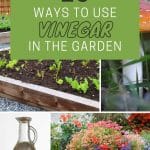
It's true! There are many little-known, yet very effective uses for vinegar in the garden. From pest control to soil amendment, there are lots of ways to use this inexpensive, common household ingredient for a cheaper, gentler solution to everyday garden problems.
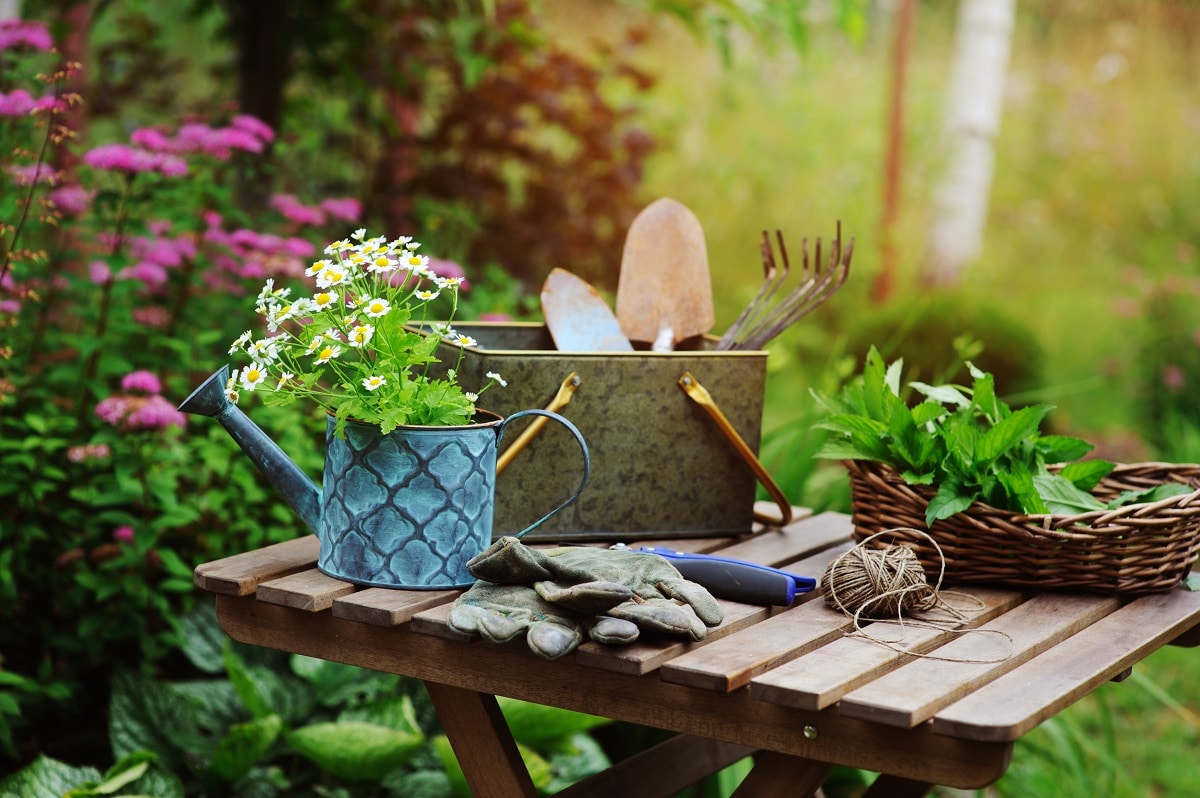
This table looks like it could use some TLC with vinegar.
What are some of the best uses for vinegar in the garden?
- Pest and animal repellant
- Fruit fly control
- Cleaner for garden tools and supplies
- Cut flower care
- Weed control
- Germination enhancer
- Soil amendment
- Fungicide
- Fruit and vegetable wash
- Stain and odor remover
Let's take a closer look.
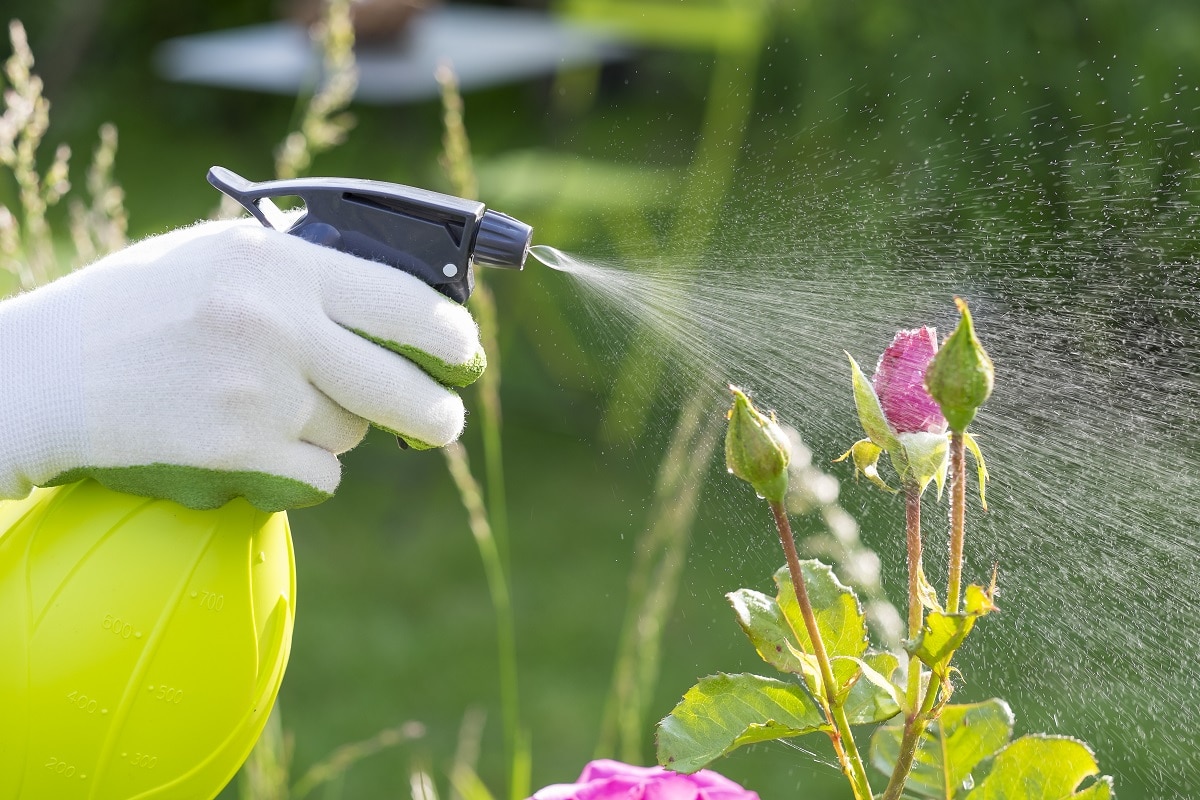
Spraying vinegar in the garden will help with a variety of different pests.
Repel Those Pests With Vinegar in the Garden
Whether you're dealing with problem insects or problem animals (including, perhaps, some you might own!), vinegar is a safe and natural way to discourage bugs, pets, wildlife, and neighborhood visitors from where they ought not be. Many insects and animals simply hate the smell of vinegar and will steer well clear of it.
Use Vinegar to Repel Insects, Especially Ants
For insects and ants, vinegar can be either a repellant or an insecticide.
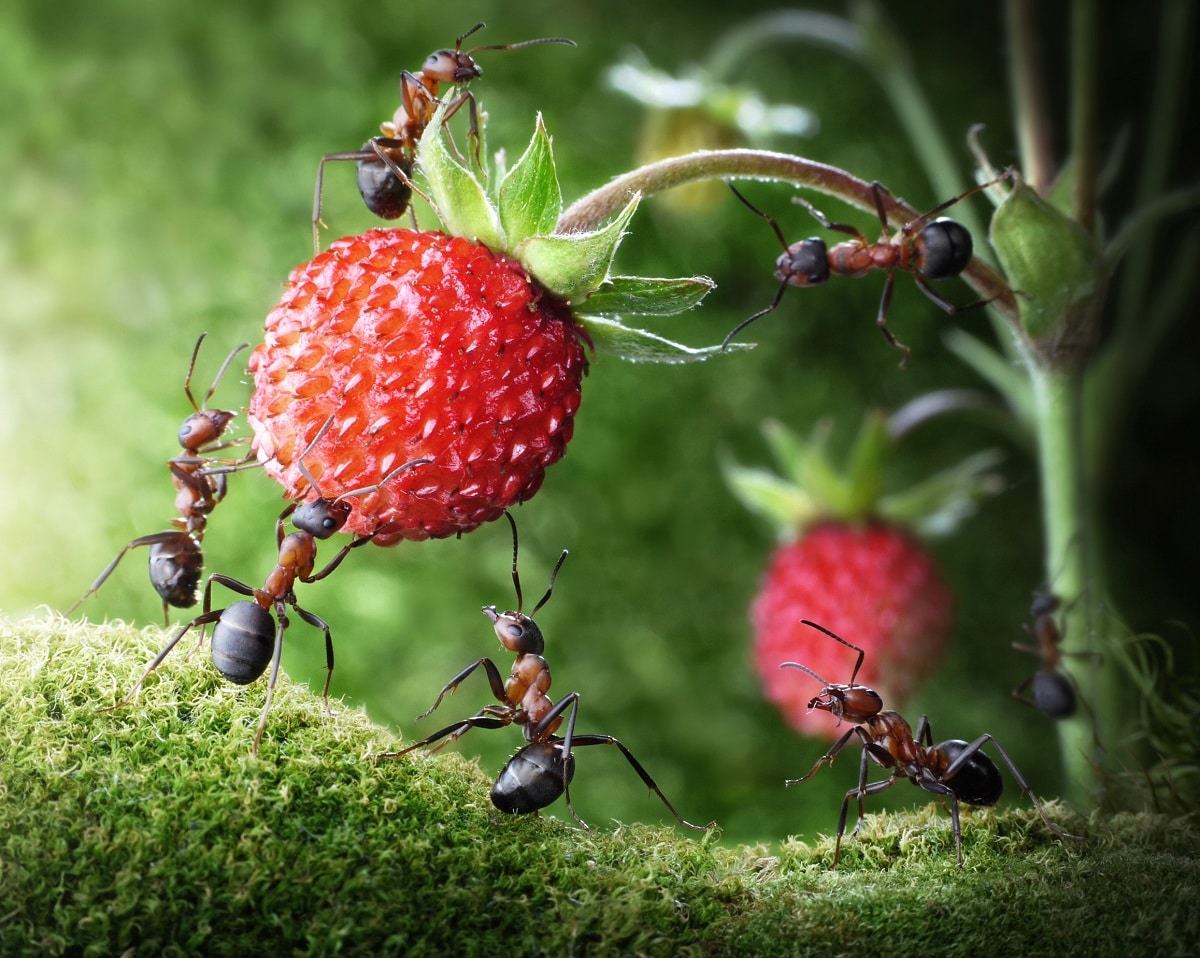
Ants won't steal your fruit if you use vinegar in the garden.
The Repe llent Recipe
Apply full-strength white vinegar to ant trails, anthills, foundations of garden beds, cold frames, and greenhouses, or along garden perimeters. You can sprinkle, spray, or pour the vinegar onto the soil or spaces.
As vinegar temporarily changes soil pH, it may be harmful to garden plants and roots so avoid applying too close to those areas (though such an application used just once or twice should be okay). Be aware that full-strength vinegar will kill plant foliage and ultimately plants when directly applied, so do not spray or pour into plants or grasses that you want to keep.
The Insecticide Recipe
Spray directly on ants and problem insects at full strength. A second option is thisinsect-killer vinegar recipe:
- 3 cups water
- 1 cup vinegar
- 1 tsp dish soap
This mixture also needs to be sprayed directly on the ants or insects to kill them. Avoid spraying on bees, pollinators, and beneficial insects, as vinegar can kill them as well.
Take care not to overspray onto valued plants, as it may harm or kill the plants (weed-killing being one of the uses of vinegar in the garden), though in this dilution it may be safe with occasional and judicious use—spot spray on one or two leaves to test before broad application to insects on plants.
Slugs and Snails
Slugs and snails can cause tremendous amounts of damage to garden plants and can be especially problematic in a wet year. This recipe will kill the slimy invaders.
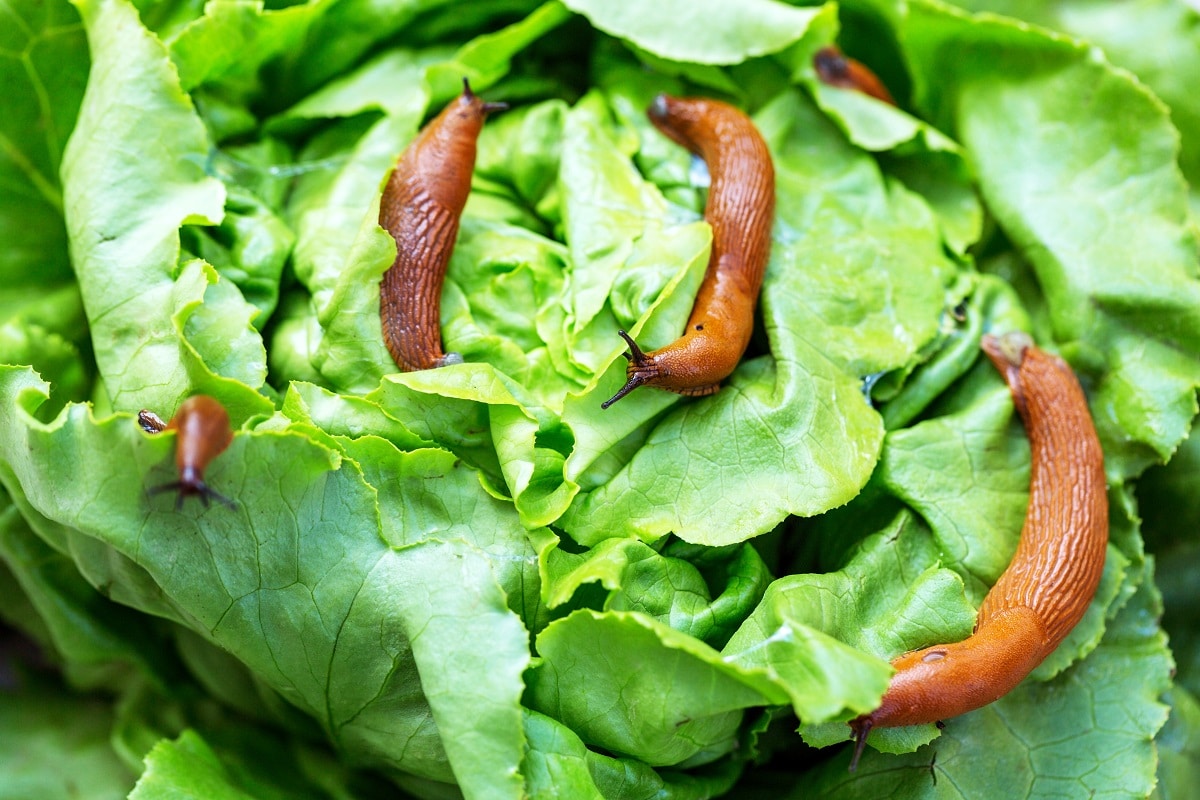
Vinegar will help keep slugs off your lettuce
Slug and Snail Repellant Recipe
- 1 cup vinegar
- 1 cup of water
Mix together in a spray bottle and spray directly on slugs and snails. Avoid over-spraying plants or test on slugs on one or two leaves before widespread use.
Household Pests and Problem Animals, Including Snakes (Pet-Safe Repellant)
Many animals, both wild and domestic, have a serious dislike for the smell of vinegar. As you'll know if you have ever sniffed too close to an open vinegar bottle, it is a serious irritant, but also, for these animals, a seriously irritating odor. Simple household vinegar can be used to keep away pets and neighborhood cats and dogs, unwanted wildlife like snakes, and garden destructors like raccoons, possums, and rabbits, without actually causing them any harm. They're unlikely to try to eat or drink vinegar (or get close enough to taste it), but vinegar is food, so even if they do, it won't hurt them (or curious "animals" of the two-legged human variety!)

Using vinegar in the garden will keep rabbits away from your food
Pet Safe Animal and Pest Repellant Recipe
- Spray or pour full-strength vinegar along perimeters and in areas where you want to keep dogs, cats, and animals away.
For areas around plants where applying to the soil might be problematic, soak sponges or rags in full-strength white vinegar and set out in cups or bowls. Reapply as needed or after rains.
Fight Fruit Flies
We think of fruit flies as an inside problem, but it's really an issue in the garden and orchards as well, or at least can be. There is even a species of fruit fly in some areas that can pierce the skins of fresh fruits and berries, and so can lay its larvae inside the fruit and render it, if not useless, at least disgusting. A simple vinegar-basedfruit fly trapset out in locations in and around the orchard or berry patch can help control the problem of outside fruit flies, which eventually becomes a problem of inside fruit flies!
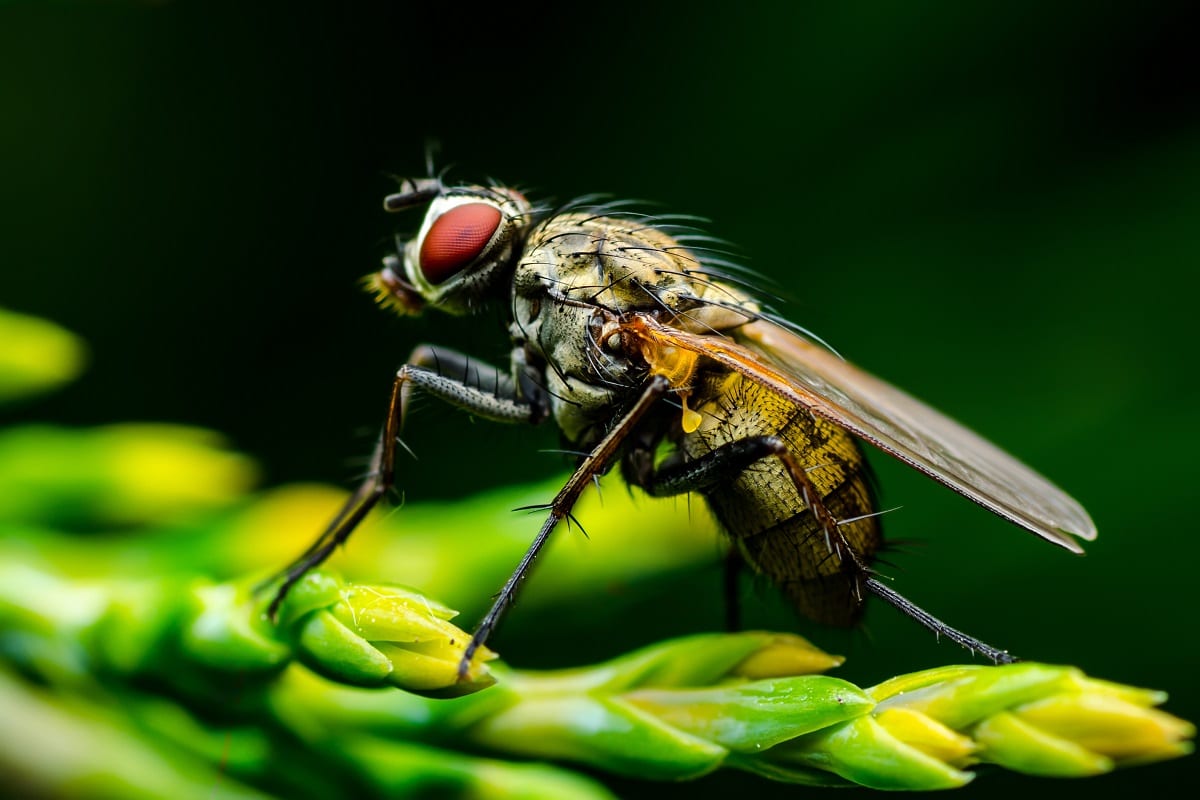
Don't let flies get up close and personal with your food, use vinegar in the garden!
Fruit Fly Trap Recipe
- 1 cup warm water
- ½ cup vinegar (common white vinegar works, but Apple Cider Vinegar or ACV can be an even better lure)
- ¼ cup sugar
- 1 tablespoon molasses
Combine all ingredients and mix well to dissolve the sugar and molasses. Pour into cups or shallow containers and place around the orchard or berry patch. You may also hang it from the branches of berry bushes and fruit trees.
Clean And Keep Tools in Tip-Top Shape with Vinegar in the Garden
Good care of garden tools, pots, containers, and supplies will keep them in good working order for many years to come. And a longer life means not only the preservation of your favorite tools of the trade but a way to save money in the garden, too. Household vinegar can be used in a variety of ways to clean garden grime. It also can remove harmful rust and other deposits that collect on garden tools and keeps them from working their best. Clean and keep these garden supplies working well with vinegar.
Rakes, Hoes, Shovels, Trowels, Weeders, and Hand Tools (plus any other garden tools that make sense)
Keeping your tools clean will help them stay rust-free as well as make using them a more pleasant experience. During the height of the garden season, you don't need to wash your tools every time you use them, though you should at least spray the dirt off them. Instead, wash them with vinegar once or twice a month. Once your gardening season is finished give your tools a good scrub with vinegar before you store them.
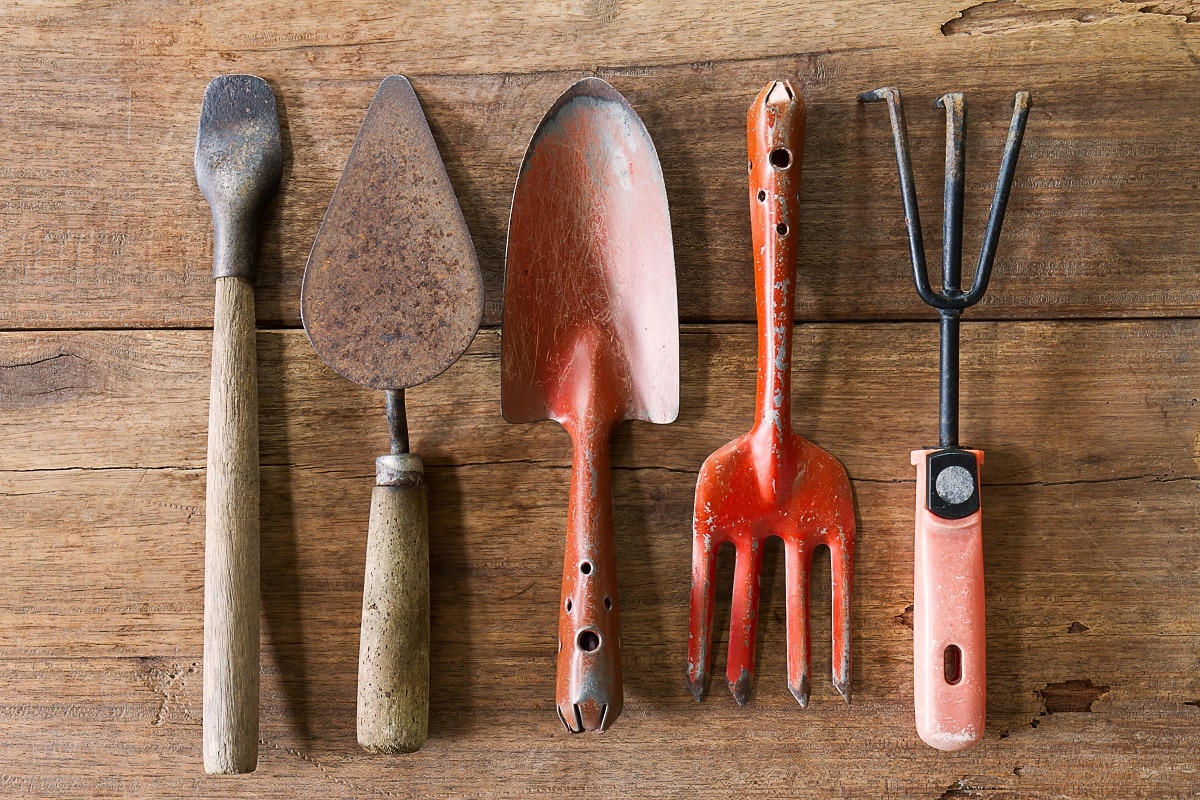
Vinegar helps keep your tools from looking like this after one season.
Garden Tool Cleaner Recipe
- Use full-strength white vinegar.
Spray all over the surface or soak the entire surface in undiluted vinegar. To remove dirt and grime, soak or let sit for 15 minutes, then spray or wipe off. This will help to prevent rust from happening, but when it does, to remove rust, spray or soak the item and let sit overnight, then wipe, rinse, and let dry. Stubborn rust can be scrubbed with fine steel wool after soaking with vinegar.
Faucets and Spray Heads
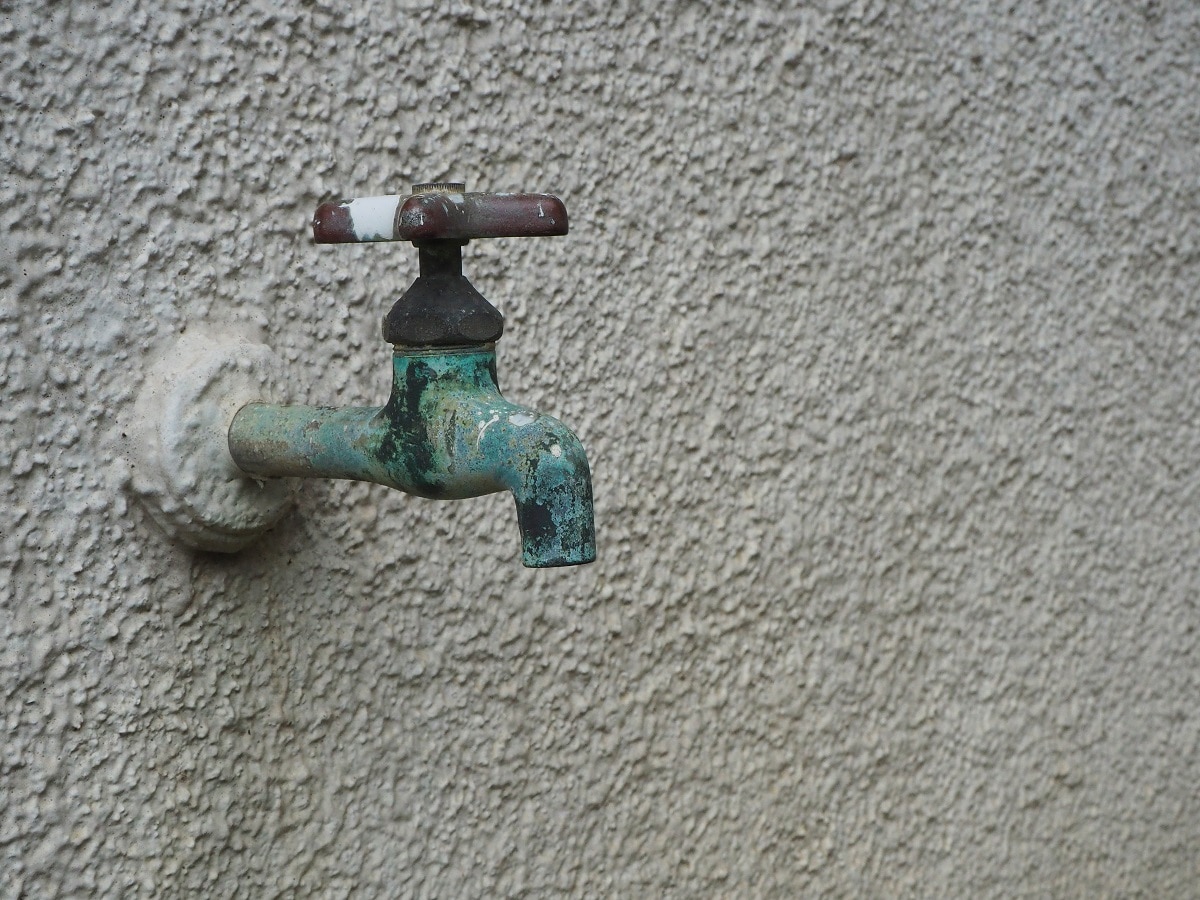
Keep your faucets looking new by washing them with vinegar
Faucet and Spray Head Cleaner Recipe
Use full-strength vinegar. Soak faucets, spray heads, or garden nozzles overnight. This will dissolve mineral deposits and calcium buildup. If you cannot remove the faucet or nozzle from the plumbing, pour the vinegar into a one-gallon heavy plastic bag and attach it to the fixture with a strong rubber band (or two). Make sure the targeted area is submerged in the vinegar.
Terracotta and Planting Pots
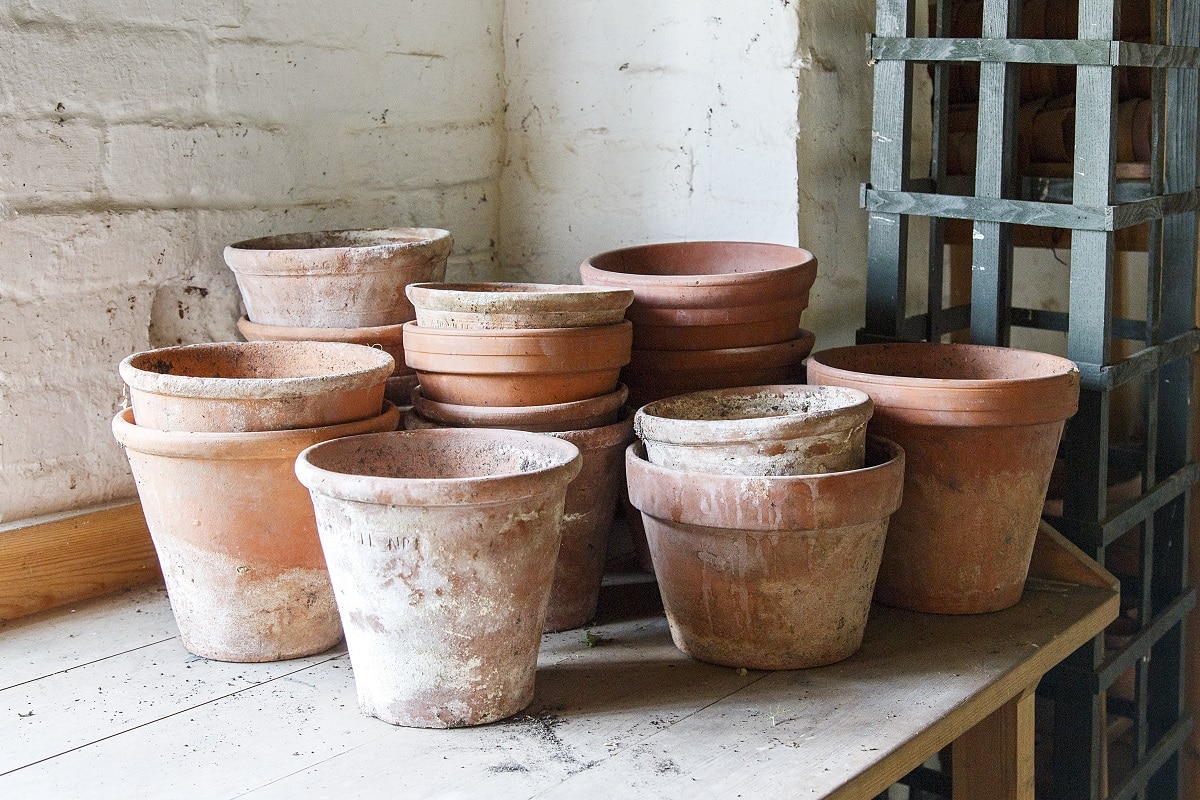
It's a good idea to wash your pots with vinegar before you reuse them
Terracotta and Planting Pots Cleaner Recipe
- 1 part vinegar
- 4 parts water
Combine the vinegar and water. Soak the pots in the solution for several hours or overnight to dissolve minerals, salt, and buildup. Remove from solution and let air dry. This will also help to kill many molds, funguses, viruses, and bacterial that can cause disease in potted plants. It is a good way to clean and disinfect reused pots prior to seed-starting or transplanting.
Vases and Other Cut Flower Containers
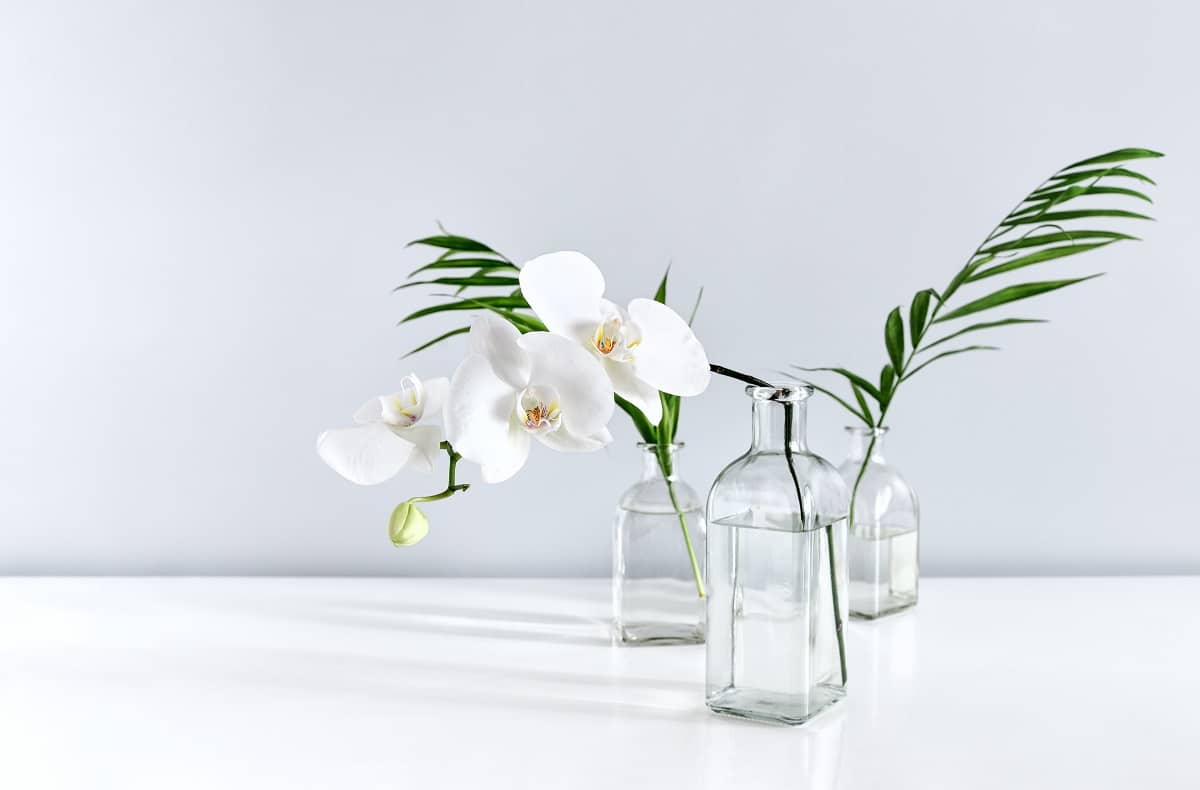
Are you washing out your vase between flowers? You should be!
Vase and Cut Flower Container Cleaner Recipe
- 1 part vinegar
- 1 part water
Combine the vinegar and water and use to wipe vases clean. For stubborn rings, stains, or deposits, soak the vase for several hours or overnight. This recipe works very well to remove the white rings that are common in cut flower vases.
Keep Cut Flowers Fresh
On that note, vinegar can be used to in the following recipe as a flower preservative in cut flower vases. It will keep the water fresher and help your cut flowers to last longer, and possibly help prevent some of those unsightly rings to begin with.

Keep your flowers fresh longer with vinegar
Flower Preservative Recipe
- 1 quart of water
- 2 tablespoons of vinegar
- 1 teaspoon of sugar
Combine all ingredients, stirring until the sugar dissolves. Use to water flowers. Replace every few days or as needed if water becomes cloudy.
Clean Up In And Around The Garden Path
Use vinegar on garden features to clear away dirt, grime, mold and mildew, and salt and mineral deposits.
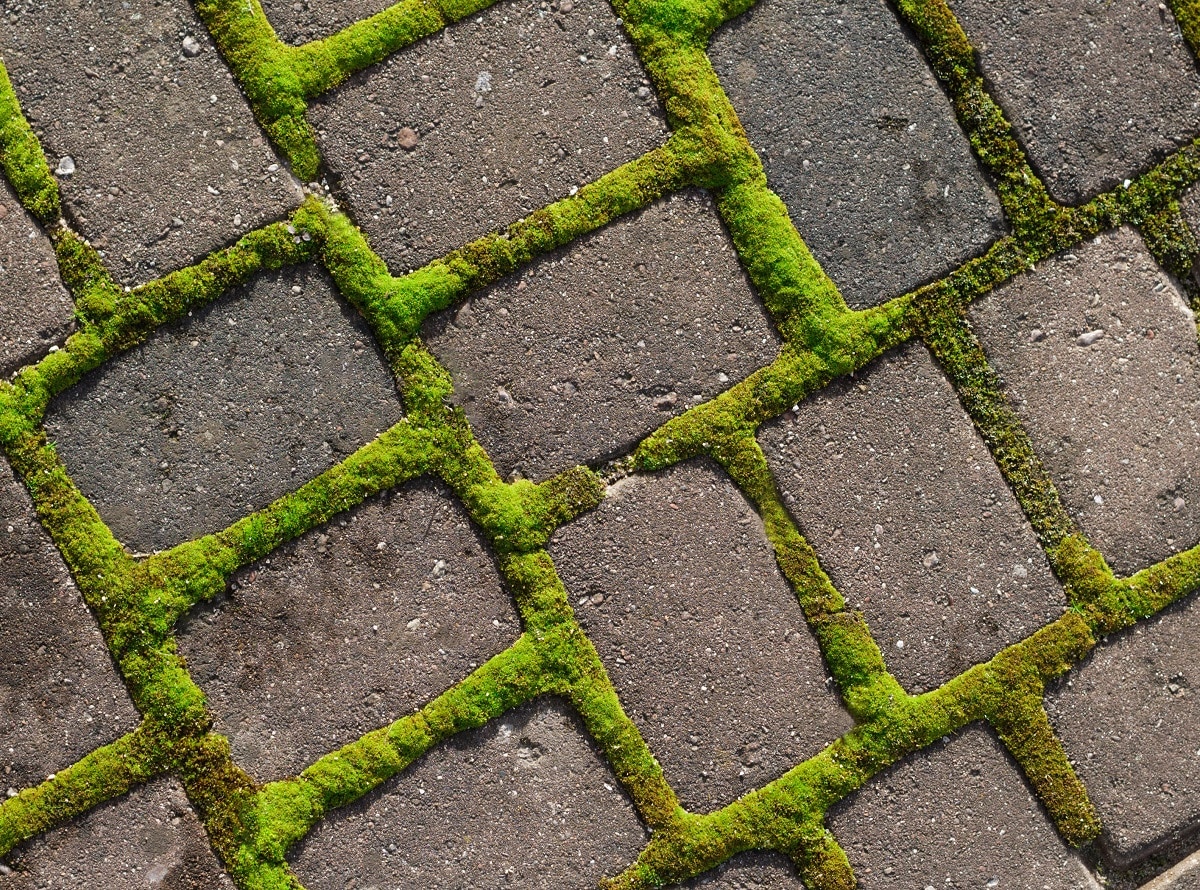
Use vinegar in the garden pathways to keep them clean
Garden Paths, Bricks, Borders, Walls, and Walkways
Garden Path Cleaner Recipe
- 1 part water
- 1 part vinegar
Mix together and spray the target area, then let soak and sit. Mineral deposits should disappear. Do note that this may mark some natural stones, so it is always a good idea to test this on an inconspicuous area first or consult an expert regarding the type of stone or material in question.
Birdbaths
Keep your feather friends happy and healthy by keeping their water supply clean. This will also help control algae and pathogens in the birds' water.
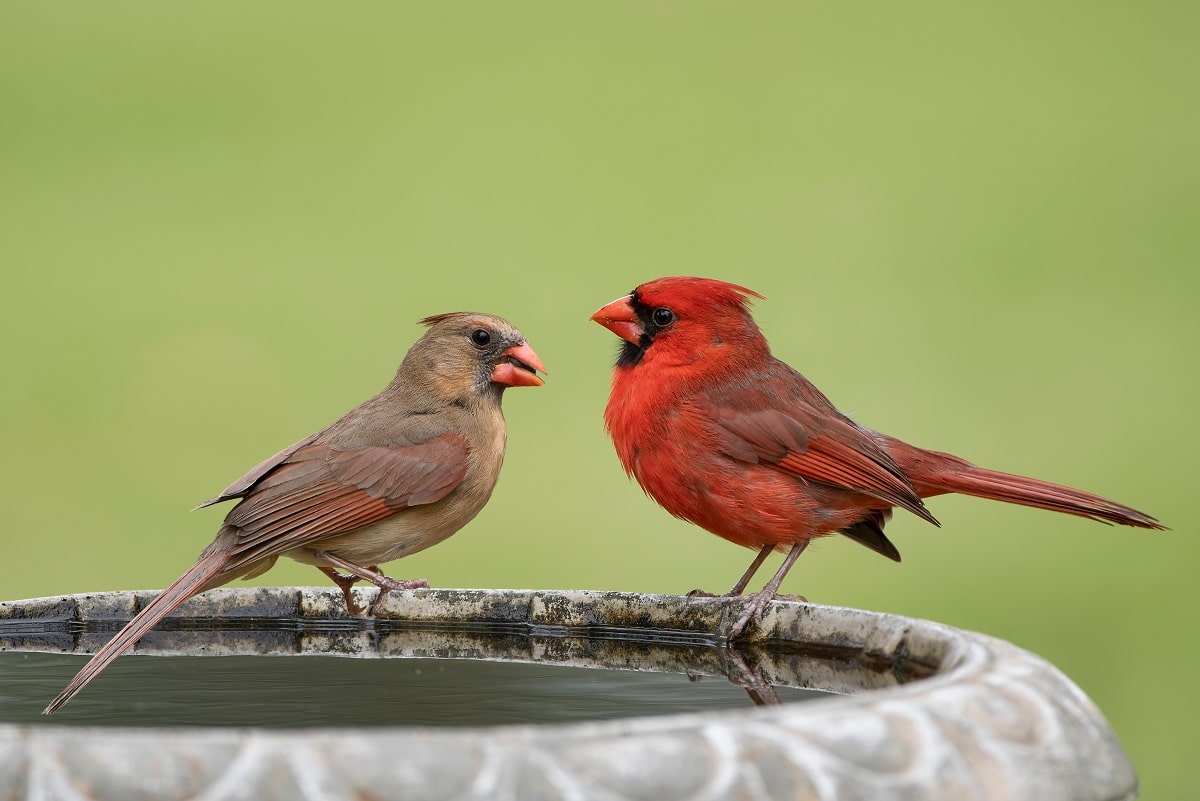
Vinegar is a bird-friendly way to keep algae from growing and keep the bath clean.
Bird Safe Birdbath Cleaner Recipe
- 1 part water
- 1 part vinegar
Combine and use to scrub bird bath surfaces. Spot test in a hidden area on stone baths prior to use over the entire surface.
Outdoor Furniture
Useful on most outdoor furniture surfaces, this solution will keep outdoor chairs, benches, and tables clean and comfortable for you to enjoy. It will help remove mold and mildew as well as dirt and grime and will aid in preventing new growth, especially if used regularly. This recipe can help remove rust on metal garden furniture as well.
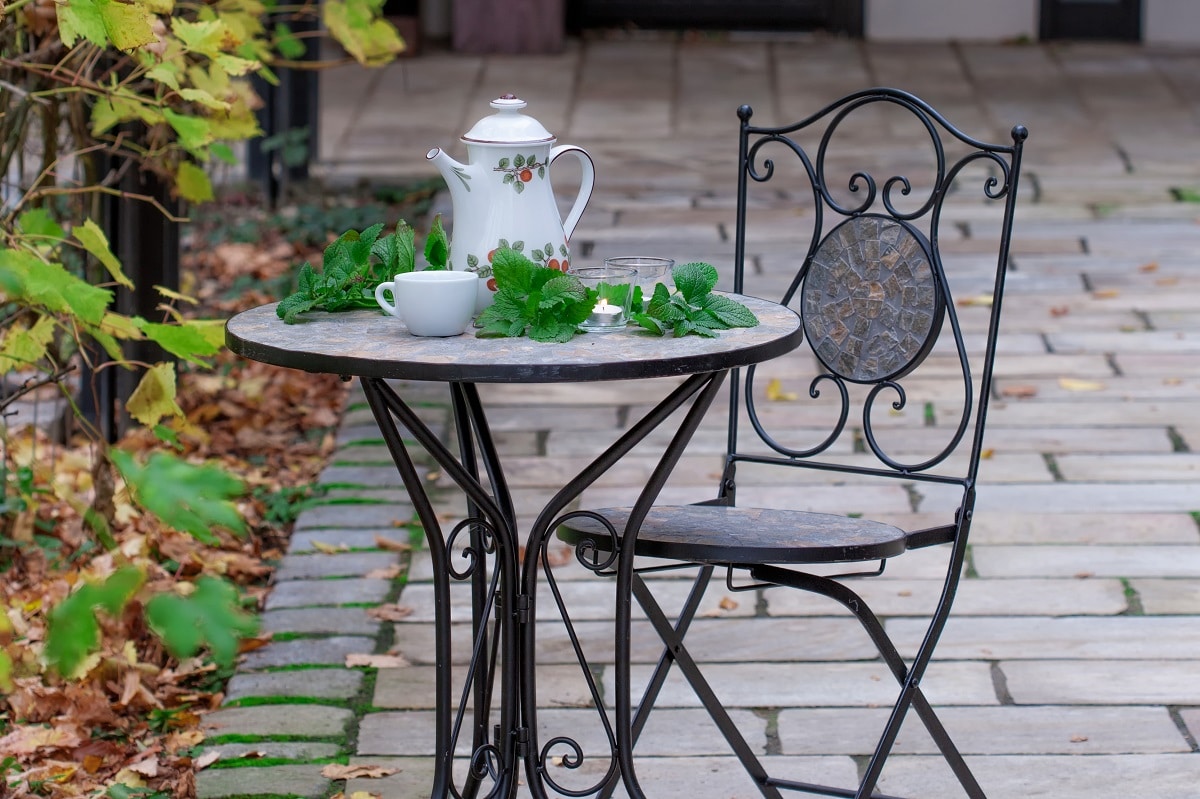
You'll extend the life of your garden furniture by cleaning it with vinegar
Outdoor Furniture Cleaner Recipe
- 1 part water
- 1 part vinegar
Combine vinegar and water and use the solution to wipe furniture surfaces clean. Rinse if necessary to remove debris, or let air dry. For stubborn buildup and grimy areas, spray the solution onto the troublesome spot and let it soak for 15 minutes, then scrub or wipe free.
Wipe Out Weeds
Vinegar as weed control has gained a lot of interest, for good reason. It is much less expensive, but more importantly, much safer than commercial chemical herbicides. Still, there seems to be some debate over its effectiveness. This may stem, in part, from people comparing it to those high-powered chemical weed killers. And truth be told, as an herbicide, vinegar won't be very effective on woodier shrubs and trees. It is most effective as a foliar spray and killer of softer green growth. As a weed control method, it requires a more frequent application to keep weeds killed. But used regularly, this safer alternative, which won't harm you, your pets, your children, or your water supply, can be used very effectively as part of a regular weed control strategy.
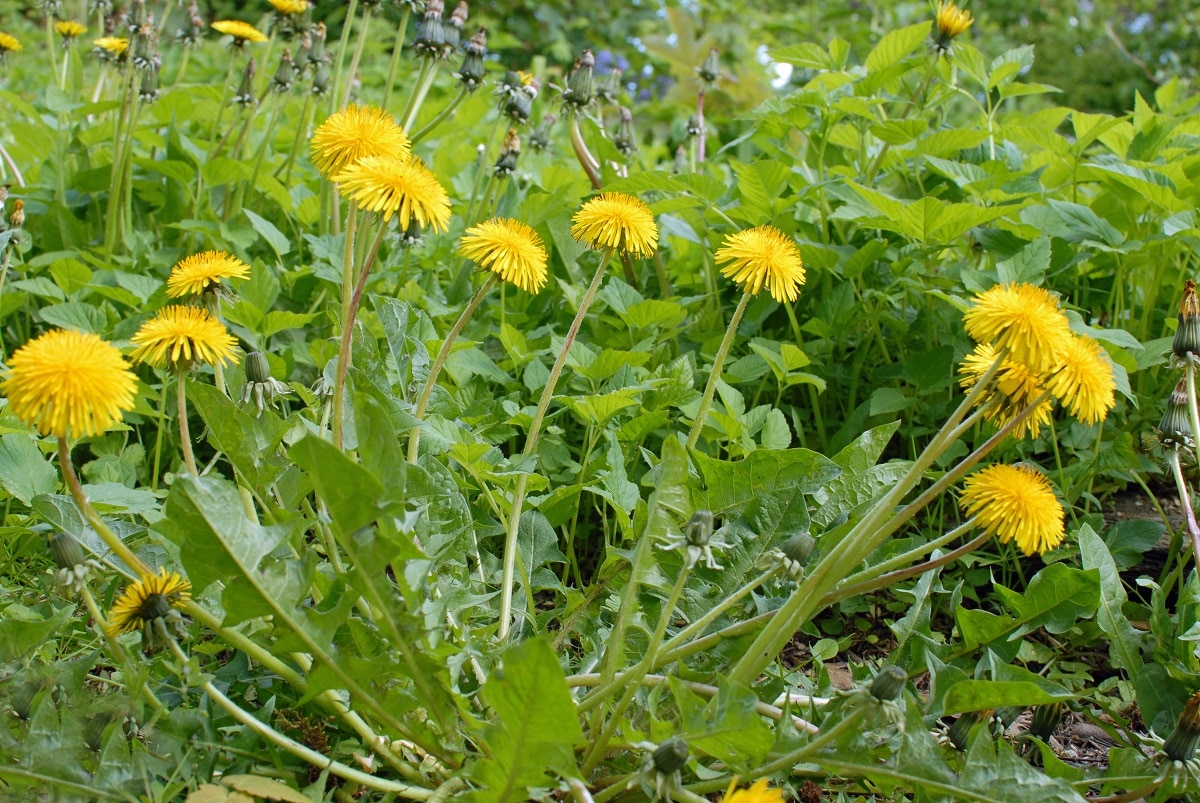
Using vinegar on weeds is a safe way to get them out of your garden
Vinegar Weed Killer Recipe
- 1 gallon white vinegar
- 1 cup salt or Epsom salt
- 1/8 cup dish soap
- Combine all ingredients together and shake or stir until thoroughly combined.
- Let sit for a while before using it so that the soap bubbles can deflate.
- Use a hand or garden sprayer and apply the solution to grasses, weeds, or plants you'd like to kill.
- Thoroughly wet both the top and underside of leaves and all areas of the plant down to the ground. It is best to do this on a calm, windless day with strong sunlight, preferably early in the morning so that the sun can help the solution work.
Be sure not to spray this solution onto plants that you want to keep. Also, the vinegar can affect the soil pH, at least for a few days, which usually will not kill other plants but may cause some stress and upset soil balance. The salt in the solution can also be harmful to nearby plants and will remain in the soil longer than the vinegar's effects. This vinegar-based weed killer is especially useful along paths and walkways where there are no other plants that can be potentially harmed and where you do not care to have any plant regrow anyway.
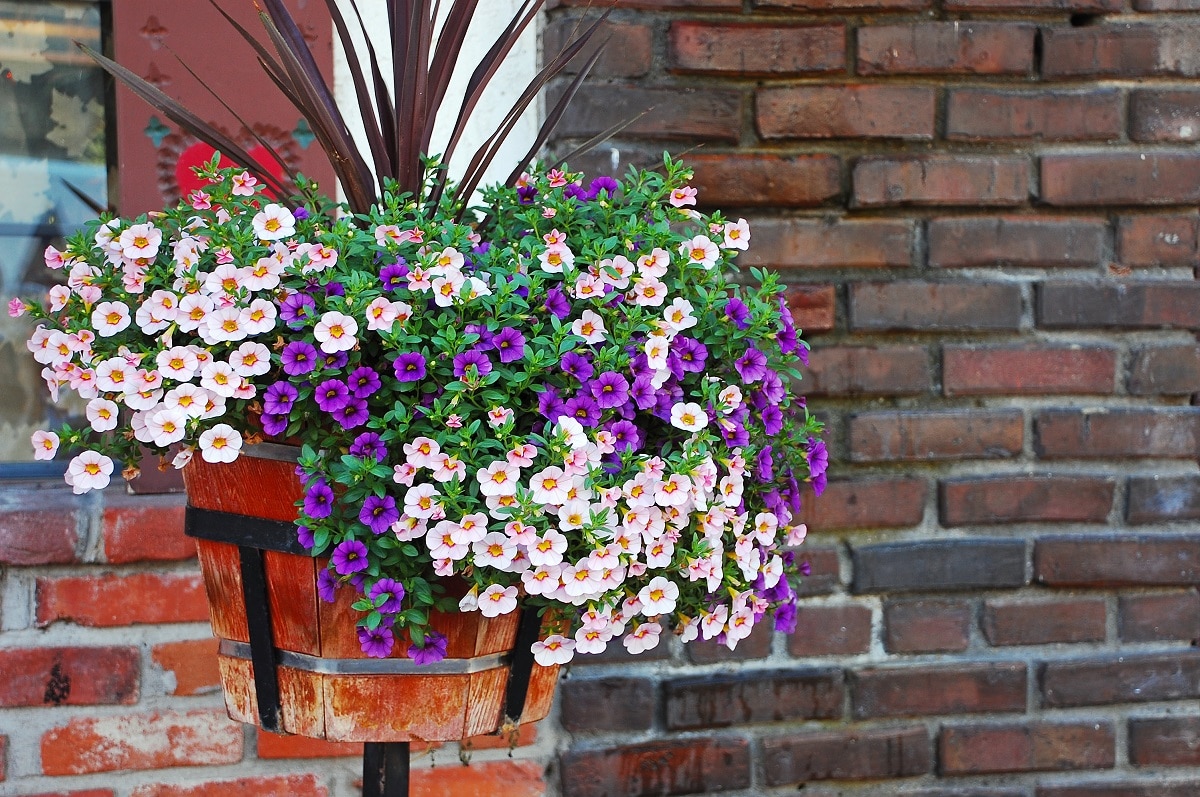
Keep your planters clean like this with regular applications of vinegar
This solution will not generally kill the roots of plants and regrowth may occur after some time. With regular re-application, the resulting defoliation will, over time, starve the plant of needed food and nutrients, and then root damage and death can occur. Therefore, repeated applications may be necessary, depending on your weed-control goals.
For this recipe, if you prefer to use stronger horticultural vinegar (an acidity of 15 to 20%), the results will be even more impressive. You do need to use caution when using vinegar of this strength, however, and protect yourself from inhalation and surface skin irritation or burns. Horticultural vinegar can be found in many garden centers, though it is not available in all areas.
The primary killing agent in this recipe is vinegar. Straight, full-strength vinegar could actually be applied by itself to the weeds to kill them. However, the added salt will help dehydrate the foliage to cause damage and death, while the dish soap acts as a carrier agent that helps the watery vinegar adhere to the leaves and foliage longer so that it can work more effectively.
A Jump on Germination
The real goal in gardening, though, is coaxing beautiful plants and tasty fruits and vegetables into life. Vinegar, believe it or not, can help with that, too!
From the very start, from the earliest of seed-starting, vinegar can help to soften hard seed coats to achieve better germination. This can increase the number of seeds that germinate and sprout, but can also help to speed the germination process.
The process of using vinegar to germinate seeds is simple—all it takes is a little vinegar and water, and several hours to pre-soak.
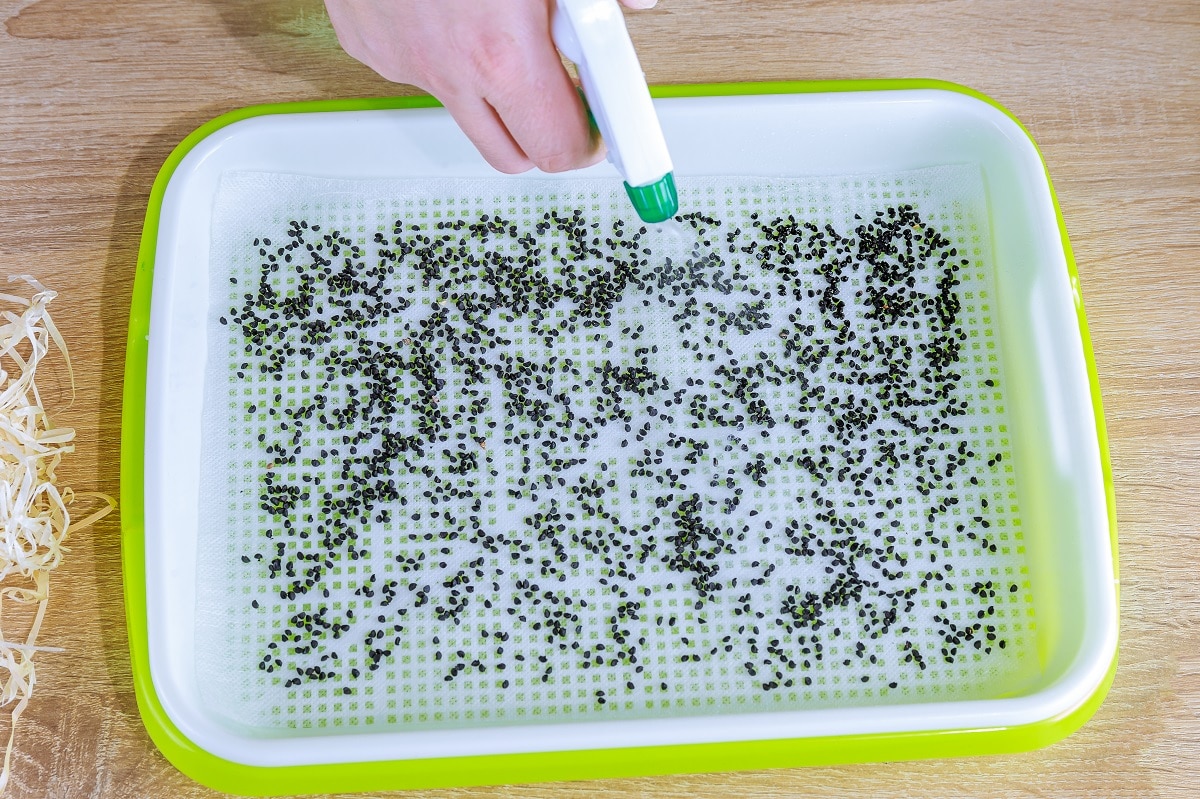
A little bit of vinegar goes a long way in the garden
Vinegar Seed Germination Recipe
- 1 cup water
- ½ cup vinegar
Simply mix the vinegar and water together, then cover the seeds, using about twice as much mixture as there are seeds (a little more will not hurt, but for seeds that absorb a lot of liquid, it might help).
Soak these seeds overnight or for eight to twelve hours, then drain, rinse, and plant. Do not soak for more than 24 hours or you can starve the seeds of oxygen and they will die. You can use this presoak either for seeds you are starting indoors or for seeds being sown directly in the ground.
This presoak method is most helpful for hard-coated seeds and seeds that are famous for difficult germination. These are often seeds that are naturally suited to areas of drought. Some seed types you will frequently see a vinegar soak recommended for are okra, nasturtiums, beans, morning glories and moonflowers, peas and sweet peas, corn—basically anything that feels like it has a hard coat.
Soil Solutions
There are a couple of ways that vinegar can be used as something of a soil amendment. This isn't, per se, an amendment such as when you add compost or organic matter to increase soil nutrients; vinegar does not provide "food" or nutrients for the plants. But it can help alter soil pH and acidity, which is helpful to some plants, and it can also break down hard minerals that make growth difficult for others.
Increasing Soil Acidity for Acid-loving Plants and Shrubs
You have probably heard it thrown about that this bush or that plant "loves acidic soil." Blueberries, hydrangeas, rhododendrons, hibiscus, and gardenias, among others, are such plants. If you struggle with any of these plants, or any other plant or shrub that prefers acidic soil, it might help to boost them with a little vinegar.
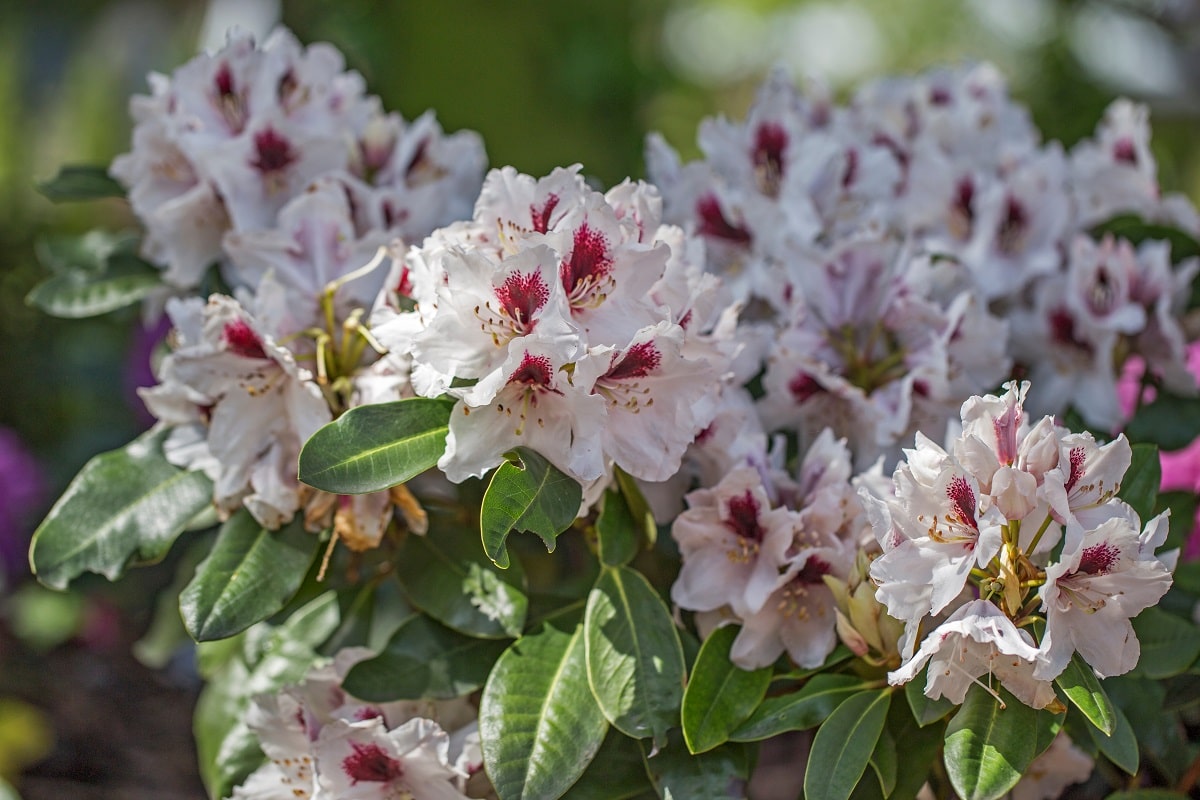
Your rhododendrons will thank you if you use a little vinegar on them.
Soil Acidity Additive Recipe
- 1 cup of white vinegar
- 1 gallon of water
Mix the two together, and then use the gallon to water your plant or shrub.
As many of these acid-loving plants are larger plants or bushes, they can often take the entire gallon all by themselves.
As an alternative, you can pour one cup of straight household vinegar around the base of the plant to feed the roots. But, diluting in water makes sense because it helps get the plant the water it needs anyway and gives you a more widespread distribution of the vinegar to more of the plant's roots.
The vinegar will not last all that long in the soil, so as a way to increase the acidity of the soil, it is a short-term advantage. This means that more frequent application is better than relying on this method as a long-term acid/soil amendment.
For acid-loving flowering bushes, the pH of the soil and available acidity can determine the color of the flowers. So, for something fun, whether or not you think your soilneedsmore acid, you might apply it just to see what spectrum of colors you can achieve!
As always, for true soil preparation and amendment, it's smart to test your soil, whether by using an easy at-home soil test kit or by sending it off to a local lab.
Counteract Hard Minerals
Minerals and lime in soils can be a very good thing for your garden, but as they say, sometimes you can have too much of a good thing. If you garden in a space with a high mineral content or hard water, or if it has been over-limed (or lime applied to an area of the garden that the subject plants will not appreciate—for example, lime should not be applied to the soil at planting time where seed potatoes are being planted, or it can cause scab on skins), a simple application of vinegar can help correct the situation. As we know, vinegar is a good cleaning agent that breaks down hard minerals and salt deposits and can help to increase soil acidity, thereby counteracting a base like lime.
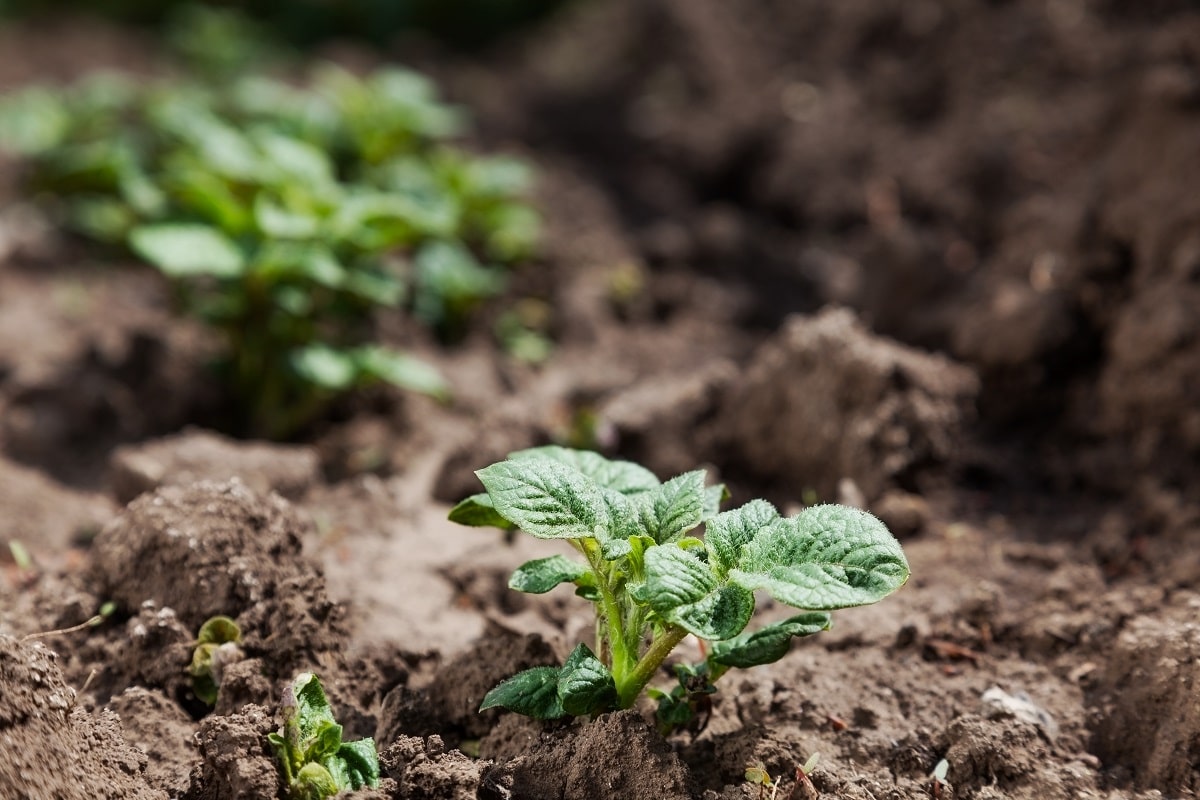
These potatoes are going to taste great in a few months!
Counteracting Hard Mineral Recipe
Apply full-strength vinegar to the soil and work in. Let sit for a week before planting.
Fighting Fungi
Funguses on plants can also benefit from a natural, at-home vinegar preparation. This can be used to help fight things like downy mildew and spot diseases on a variety of garden plants and vegetables.

Mushrooms are a great sign in the garden, but you really don't want them there.
Garden AntiFungal Recipe
- ¼ cup dried chamomile (or 1 cup fresh flowers)—about 4 or 5 teabags
- 3 cups boiling water
- 2 tablespoons vinegar
- Pour the boiling water over the chamomile in a heat-proof bowl, pot, or jar. Let sit and steep for 24 hours.
- Strain out the chamomile and stir in the vinegar.
- Apply as a spray-on all affected parts of the plant.
- Let air dry. Reapply as needed, but wait for at least three to five days between applications (extend the period between applications if the plant seems stressed).
You may also apply this spray to soils in pots or around the base of the plant to help control spores.
Remember it is always wise, when using any vinegar-based solution, to spot-test on a leaf or small area of the plant first to test its ability to withstand the acid (since in strong concentrations vinegar is a plant and foliar killer, too).
Pristine Produce
Not just for garden tools, vinegar is a very good household cleaner, and that includes as a natural, food-safe cleanser for your fruits and vegetables, too!
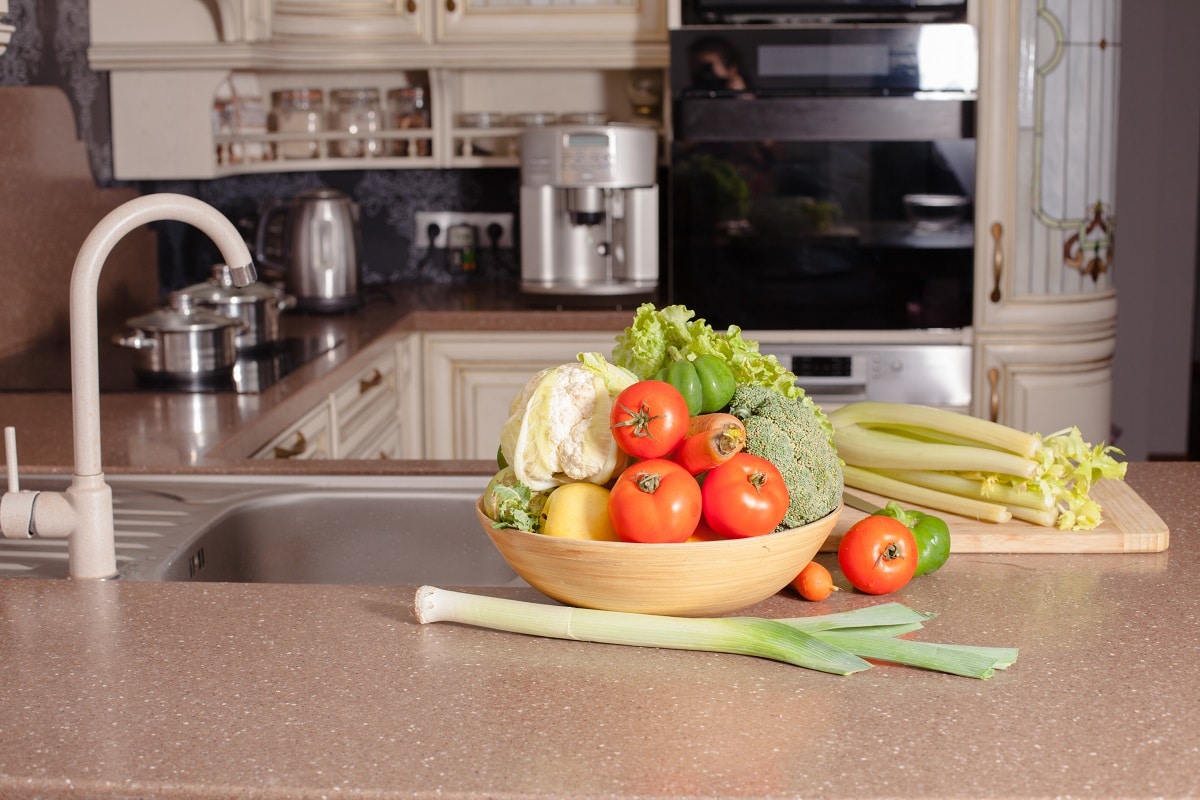
Giving your veggies a bit of a wash after you pick them can have a big benefit
Produce Cleaner Recipe
- 1-gallon cold water
- 1/4 cup vinegar
- Very simply, mix the vinegar into the water in a sink or basin.
- Soak your berries, fruit, or vegetables in the solution for 20 minutes.
- Drain or remove the produce from the vinegar water. Do not rinse the vinegar off.
- Let produce dry on paper towels or spin in a salad spinner before packing and storing.
Though initially, you will detect some vinegar odor, this will dissipate as the fruit or vegetables dry and your food will not end up tasting like vinegar.
This solution helps to kill mold, bacteria (like salmonella, listeria, and e. coli), yeasts that degrade fresh produce and cause unintentional fermentation, some viruses, and other pathogens (the complete list of which is not yet known). Vinegar also is a very good remover of dirt, debris, wax, and grime. After use, store dried produce as you normally would. The vinegar disinfection will help to prolong the shelf life and storage capability of your hard-won vegetables and fruits (including any you didn't grow, but may have purchased elsewhere).
Say Goodbye To Stains And Smells With Vinegar in the Garden
Finally, there is a very good use for vinegar for you, too, after all, your garden and food-preparation labors. You know those stubborn stains some vegetables and many fruits and berries can impart? Leaving you looking green around the fingernails or something akin to an axe murderer? Vinegar is a great way to remove those stains!
Ditto for those vegetables and foods that leave behind, let us say, less than attractive scents? Do garlic and onions ring a bell?
To rid yourself of those unsightly, unseemly stains and smells, simply rub your hands with straight household vinegar, then rinse and wash with soap. This may be somewhat drying, especially if you have sensitive skin, so it is wise to apply a good hand lotion immediately after (and of course, discontinue the practice if it proves too troublesome!), but it can leave you fresh and ready for a nice dinner date…maybe one quietly enjoying a home-cooked meal of delicious vegetables you grew yourself?
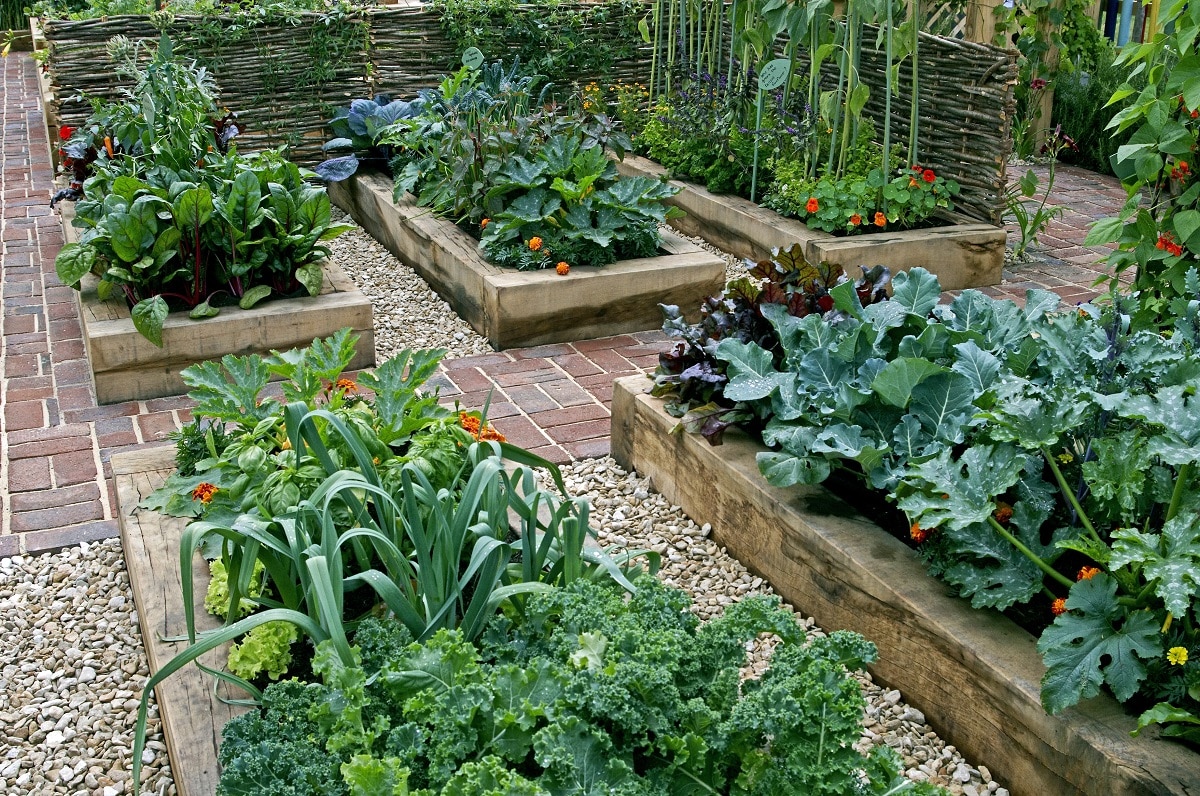
You would never know vinegar is being used in this garden
Make Common Household Vinegar Your Garden Weapon Of Choice
It's pretty clear to see that common, everyday, cheap old vinegar can really do a lot for you in your garden as well as in your home. If you keep a gallon or two of regular white vinegar on hand, you'll be ready to tackle all sorts of garden problems (and if it's left over, you'll be ready for plenty of pickling!).
The recipes and uses included here use primarily distilled white vinegar, which is typically five to six percent acidity. This vinegar will work and is really allyou need for any one of these recipes or uses. There are some other vinegar options that can be useful for some of these applications (mostly noted in the recipes above).
Ten Percent Malt Vinegaris effective and can be used in recipes such as weed killers or cleaning soaks to increase acidity.
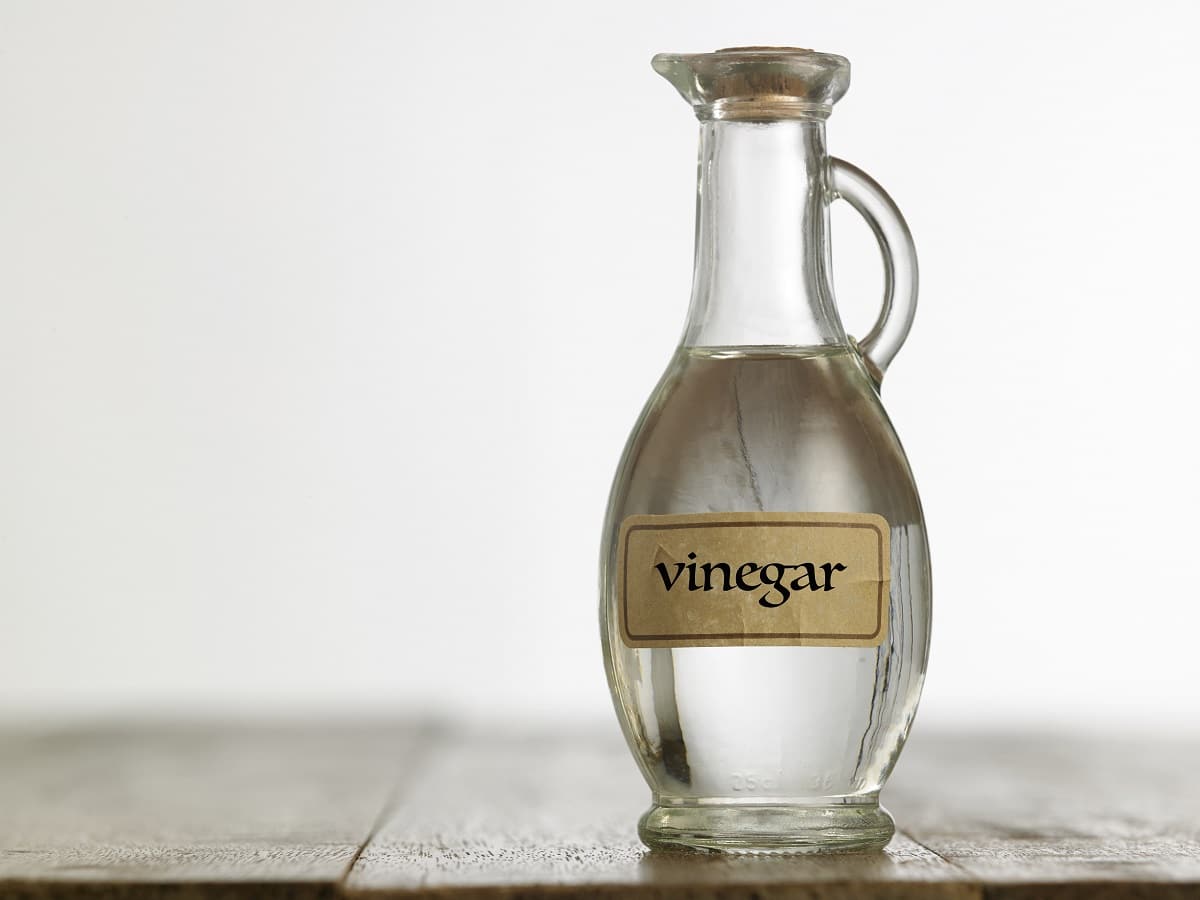
Isn't this bottle of vinegar adorable!?!
Apple Cider Vinegar (ACV)is a little less effective and slightly less acidic for many of the uses listed here, but still useful and has a place in things like luring in fruit flies and pests that you'd like to trap away.
Horticultural Vinegaris available, but harder to find and certainly more expensive. Still, it's a higher-powered yet still natural solution. It is usually a 15 to 20% acidity and requires care and caution in its use. Take care when using it—it can burn both you and anything it touches and can be quite uncomfortable to inhale. Use protection for eyes, nose, and skin whenever you use horticultural-strength vinegar—a good idea no matter what type or strength of vinegar you're using, but especially so with higher concentrations.
No matter what type of vinegar or recipe you choose, it is wise to always use reasonable precautions, spot test recipes, and solutions before applying to larger areas, and follow labeling on products when applicable. With care and caution, vinegar may just be your next great garden solution!
How To Use Vineger To Protect Your Garden Abd Vegetables
Source: https://gardening.org/20-uses-for-vinegar-in-the-garden/
Posted by: nolandrowend.blogspot.com

0 Response to "How To Use Vineger To Protect Your Garden Abd Vegetables"
Post a Comment